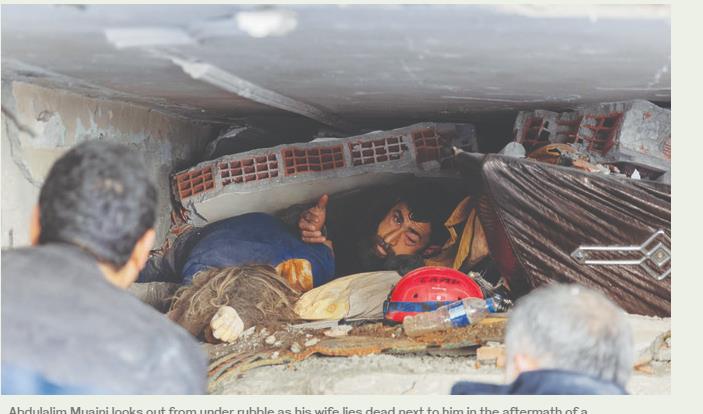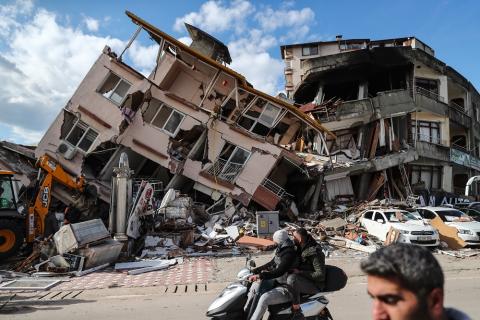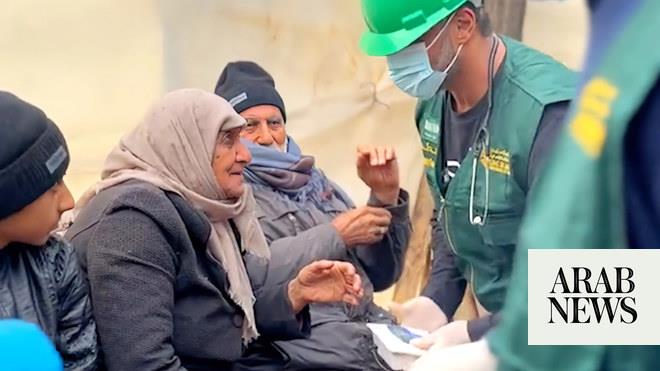
Devastating 7.8 magnitude quake on Feb. 6, 2023, killed more than 59,000 in Syria and Turkiye
SYRIA/TURKIYE: A year ago, Sido Naji woke to his house shaking in northwest Syria. He was used to the sounds of shelling and airstrikes after more than a decade of war, but this time the assailant was a force of nature: a massive earthquake.
The 16-year-old and his father managed to flee before the house collapsed. As they zig-zagged through a crowded street in Jinderis in Aleppo province, a stone wall crashed onto them, crushing the teen’s leg and breaking his arm.
The devastating 7.8 magnitude earthquake on Feb. 6, 2023, killed more than 59,000 people in Syria and Turkiye.
For its survivors in Syria, the massive temblor compounded already rampant poverty, destroyed hospitals and electrical and water systems, and forced many Syrians already displaced by war to move into tented settlements.
FASTFACT
An expert report on one of the collapsed buildings at the complex concluded that rules were ‘not sufficiently complied with.’ But Omer Godeoglu, a lawyer for the families, said a lack of evidence could mitigate punishment for those responsible.
In Jinderis, as in many of Syria’s earthquake-hit areas, there has been nearly no reconstruction and whole blocks still lie in rubble. Naji, whose leg was amputated, lives in a muddy tent.
“It’s cold at night and there is no lumber (for heating) or anything,” he said.
Syria has been wracked by an uprising-turned-civil war since 2011, and the conflict in the opposition-held northwestern enclave is at its worst in years. Syrian and Russian military shelling and strikes have killed dozens of people and displaced more than 100,000 others there since August.
The earthquake killed at least 6,000 people in Syria, mainly in the northwest, where most of the 4.5 million people rely on humanitarian aid to survive. Some 800,000 people living in tents need to be rehoused.
The World Bank estimates the quake caused more than $5 billion in damage across northern Syria.
Nonetheless, an initial outpouring of international assistance quickly subsided. UN agencies and other humanitarian organizations have been struggling to fund programs that provide a lifeline in Syria, blaming donor fatigue, the COVID-19 pandemic, and conflicts elsewhere that have erupted in recent years.
The UN’s World Food Programme, which estimates that over 12 million Syrians lack regular access to food, announced in December that it would stop its main assistance program in Syria in 2024.
Tanya Evans, the International Rescue Committee’s Syria Country Director says needs on both sides of Syria’s frontline have never been higher.
The UN was only able to secure 37 percent of the $5.3 billion needed for its 2023 humanitarian response in Syria, which Carden said was one of the lowest funding targets since the conflict started.
Zahide Seker in Turkiye’s contemplated suicide many times after losing almost her entire family.
Instead, the 48-year-old decided to pin her hopes on a fight for justice, demanding that those she holds responsible for the collapse of her building near the quake’s epicenter in the city of Kahramanmaras are hunted down and brought to account.
“I will not stay silent until justice is served,” she said at one of the small container homes that serve as the temporary residences for hundreds of thousands of survivors across 11 quake-hit provinces.
Seker lived in Kahramanmaras’s Ebrar complex, a centrally located group of eight-floor buildings where 1,400 died.
Officials said nearly 7,500 buildings collapsed in the city center alone, overwhelming rescuers in snowy storms that descended on the region at the time.
Seker pulled out the bodies of her two children with her bare hands on the sixth day.
“They took away my joy for life. It’s been a year. I can’t get over this trauma. I wanted to die many times,” she said, breaking down in tears.
“Only justice will console me now.”
President Recep Tayyip Erdogan blamed the scale of the toll on negligent building contractors, accusing them of cutting corners by using cheap concrete and ignoring basic construction standards.
More than 200 contractors and developers were arrested in the immediate aftermath of the quake. Some tried to flee abroad and were detained at Istanbul airports.
But lawyers representing victims’ families fear that numerous contractors may escape blame because much of the incriminating evidence disappeared when bulldozers cleared the debris.
Meanwhile, probes into public officials who approved building permits and signed off on the safety inspections may only be launched with the Interior Ministry’s permission, which has been conspicuous by its absence.
Nebahat Pacala, who lost her husband, daughter and granddaughter, said she kept warning contractors they were building on unstable ground and violating safety codes.
“They built a prayer room below the first floor. They cut the supporting columns,” the 68-year-old said, adding that her apartment walls had begun to swell because of water damage.
“But the contractors threatened my son when we warned them,” Pacala said.
Tevfik Tepebasi, a senior contractor at the Ebrar site, argued in court that he should not be charged with a crime because, he said, “I don’t know anything about construction” — an argument that created uproar in the Turkish media.
He faces up to 22-and-a-half years in prison if convicted of causing death or injury by gross negligence, and is being prosecuted in other quake-related cases too.












